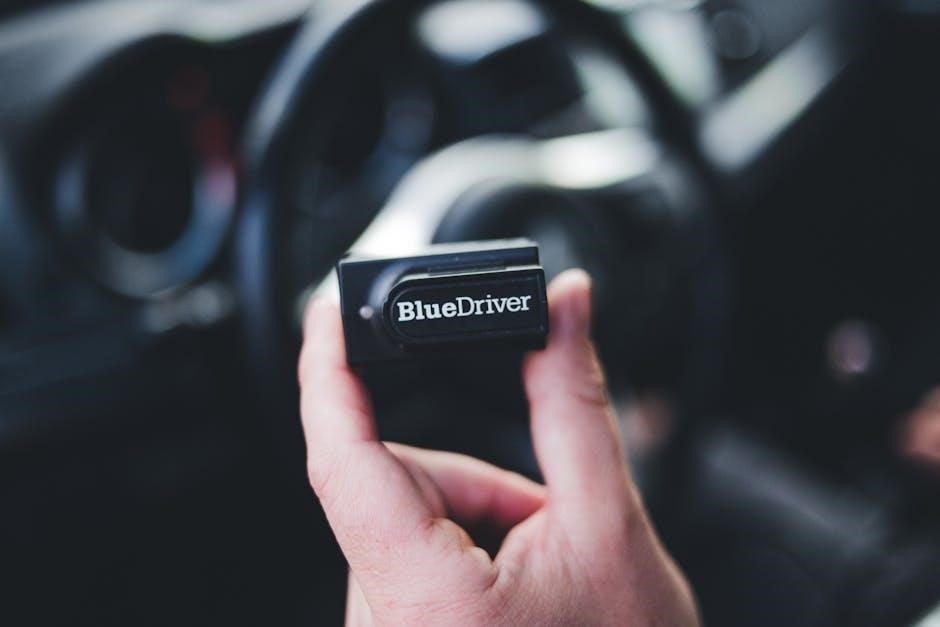
driver manual nj pdf
The New Jersey Driver Manual is a essential guide published by the NJ MVC, covering road rules, licensing procedures, traffic laws, and safe driving practices.
Overview of the NJ Driver Manual
The NJ Driver Manual provides comprehensive details on road safety, traffic laws, and licensing requirements. It includes chapters on driving rules, traffic signs, and the Graduated Driver License program. Available in English and Spanish, the manual is essential for new drivers, preparing them for written and road tests while ensuring compliance with state regulations.
Importance of the Driver Manual for New Jersey Residents
The NJ Driver Manual is crucial for residents as it outlines state-specific traffic laws, licensing steps, and safety guidelines; It equips drivers with knowledge to pass tests and stay compliant, ensuring safer roads and informed drivers across New Jersey.
Accessing the NJ Driver Manual
The NJ Driver Manual is readily available online as a free PDF download from the NJ MVC website, ensuring easy access for all residents. It is offered in English and Spanish, making it inclusive for diverse audiences. The digital format allows for convenient viewing on various devices, reducing the need for physical copies and promoting environmental sustainability. Regular updates ensure the manual remains current with New Jersey’s traffic laws and regulations.
Downloading the PDF Version from the MVC Website
The NJ Driver Manual is available as a free PDF download from the NJ MVC website. This digital format allows residents to access the manual conveniently without needing a physical copy. The PDF version is easy to navigate and can be viewed on various devices, ensuring accessibility and portability. Regular updates ensure the content stays current with New Jersey traffic laws.
Availability in Multiple Languages (English and Spanish)
The NJ Driver Manual is available in both English and Spanish, ensuring accessibility for all residents. The Spanish version, Manual del Conductor de Nueva Jersey, mirrors the English content and is downloadable from the MVC website. This bilingual availability reflects the MVC’s commitment to inclusivity and helping non-English speakers understand traffic laws and licensing requirements effectively.
Types of Driver Licenses in New Jersey
New Jersey offers several types of driver licenses, including the Standard Driver License (Class D), Commercial Driver License (CDL), and Motorcycle License (Class F), each with specific requirements and purposes as detailed in the manual.
Standard Driver License (Class D)
The Standard Driver License (Class D) is for operating passenger vehicles. It’s the most common license, requiring applicants to pass vision, knowledge, and road tests. Eligibility starts at 17 years old, with younger applicants needing parental consent. The manual outlines the steps and requirements for obtaining this license, ensuring drivers are well-prepared for the road.
Commercial Driver License (CDL)
A Commercial Driver License (CDL) is required for operating vehicles over 26,001 pounds or transporting hazardous materials. Classes include A, B, and C, with specific endorsements. Applicants must be at least 21 years old, pass vision, knowledge, and road tests, and obtain a Commercial Learner’s Permit. The manual details requirements and testing procedures for CDL applicants.
Motorcycle License (Class F)
To obtain a Motorcycle License (Class F), applicants must be at least 17 years old and hold a basic driver license. The process includes passing a Motorcycle Knowledge Test and a road test. The NJ Driver Manual provides detailed instructions and study materials to prepare for these exams. Visit the NJ MVC website for the manual.
Eligibility Requirements
The NJ MVC outlines specific eligibility criteria, including age, residency, and medical fitness, ensuring applicants meet all necessary standards before obtaining a driver license.
Age Requirements for Obtaining a Driver License
In New Jersey, applicants must meet specific age requirements to obtain a driver license. For a standard license, individuals must be at least 17 years old. However, those under 17 can apply for a probationary license, starting at 16 years old with parental consent and completion of the GDL program requirements.
Documentation Needed for Application
Applicants must provide proof of identity, residency, and Social Security number. Required documents include a valid birth certificate, passport, or valid permanent resident card. Additional proof of New Jersey residency, such as a utility bill or lease, is also mandatory. Different requirements apply for U.S. citizens versus non-citizens, and some applications may need additional forms like parental consent.
Vision and Medical Requirements
Vision and Medical Requirements
Applicants must pass a vision test with a visual acuity of at least 20/50 in each eye, or 20/70 with both eyes. Corrective lenses are permitted if needed. Certain medical conditions may require a doctor’s note. Individuals with severe vision or medical impairments may face license restrictions or denial if they cannot safely operate a vehicle.
The Graduated Driver License (GDL) Program
The GDL Program is mandatory for new drivers, providing a structured approach to gaining driving experience under supervision to enhance road safety and skill development.
Stages of the GDL Program
The GDL Program includes three stages: learner’s permit, probationary license, and unrestricted license. Applicants must pass a written test, complete supervised driving, and meet eligibility criteria to progress through each stage, ensuring gradual development of driving skills and responsibility.
Restrictions for Young Drivers
Young drivers under the GDL Program face restrictions, including limits on passengers (only one unless family) and a late-night driving curfew (11 PM to 5 AM). They must hold a permit for six months before applying for a probationary license, ensuring safer development of driving skills.
Study Materials and Resources
The NJ driver manual, practice tests, and study guides are essential resources for preparing for written and road tests, available on the MVC website.
Using the Driver Manual for Written and Road Tests
The NJ driver manual is crucial for preparing for written and road tests. It covers traffic laws, road signs, and driving rules, ensuring applicants are well-informed. Use it to review key topics like safe driving practices, license requirements, and test procedures to improve your readiness and confidence before taking the exams.
Additional Study Resources (Practice Tests, Guides)
Supplement your study with free NJ MVC practice tests and guides available online. These resources help reinforce your understanding of traffic laws, road signs, and driving techniques. Utilize the NJ MVC website for downloadable PDF guides and interactive tools to enhance your preparation for both written and road tests effectively.

MVC Website and Online Services
The NJ MVC website offers convenient access to driver manuals, practice tests, and essential forms. It streamlines tasks like scheduling appointments and renewing licenses online efficiently.
Navigating the NJ MVC Official Website
The NJ MVC website provides a user-friendly interface for accessing resources like the driver manual, practice tests, and essential forms. Users can easily navigate sections such as “Licenses & Permits” and “Forms & Publications” to find the NJ Driver Manual in PDF format. The website also offers 24/7 access to services, enabling residents to download materials or schedule appointments efficiently.
Benefits of Online Access to the Driver Manual
Online access to the NJ Driver Manual offers convenience, allowing users to download and study the guide anytime, anywhere. It eliminates the need for in-person visits, saving time. The PDF format is easily searchable, enabling quick access to specific topics. Regular updates ensure users have the most current information, preparing them effectively for tests and driving responsibilities.

Preparation for Tests
Preparation for Tests is crucial for obtaining a New Jersey driver license. The NJ Driver Manual provides detailed information for both written and road tests, ensuring applicants are well-prepared.
Written Knowledge Test Overview
The Written Knowledge Test in New Jersey assesses familiarity with traffic laws, safe driving practices, road signs, and rules. The NJ Driver Manual serves as the primary study resource, covering essential topics to ensure applicants are well-prepared for the exam. The test is a critical step toward obtaining a driver license in New Jersey.
Preparing for the Road Test
Preparing for the Road Test involves practicing driving skills, vehicle inspection, parking, turning, and following traffic laws. Reviewing the NJ Driver Manual ensures familiarity with evaluation criteria. Focus on demonstrating safe driving habits, smooth vehicle control, and adherence to road signs and regulations to achieve a successful test outcome.

New Jersey Traffic Laws
New Jersey traffic laws outline essential rules, right-of-way procedures, speed limits, and safe driving practices. Understanding these ensures compliance and safe road interactions.
Key Traffic Rules and Regulations
New Jersey traffic laws emphasize right-of-way rules, speed limits, and mandatory seat belt use. Drivers must obey all traffic signs, signals, and markings. Handheld cell phone use is prohibited, and speeding in school zones carries strict penalties. These regulations ensure road safety and promote responsible driving practices statewide.
Consequences of Violations
Violating traffic laws in New Jersey can result in fines, license suspension, or even revocation. Points are added to driving records for offenses like speeding or reckless driving. Accumulating 12 points leads to a suspended license. DUI convictions carry severe penalties, including mandatory fines and license revocation. Compliance with traffic laws is essential to maintain driving privileges and avoid legal consequences.

Obtaining a Duplicate or Renewal
Replacement or renewal of a lost or expired license involves submitting required documents, paying fees, and following MVC procedures. Online services simplify the process for convenience.
Process for Replacing a Lost License
To replace a lost license, visit the MVC website to download and complete form REG 227. Gather required documents, such as proof of identity and residency. Submit the application in person at an MVC agency, paying the necessary fees. Online services may also be available for convenience, ensuring a smooth replacement process.
Renewal Requirements and Procedures
To renew a driver license, visit the NJ MVC website to download and complete the renewal application. Required documents include proof of identity, residency, and Social Security. Submit the application online or in person at an MVC agency, along with the renewal fee. Licenses for drivers under 21 are valid for four years, while others are valid for six years.
The NJ Driver Manual is a comprehensive guide to licensing, traffic laws, and road safety. Use it effectively to prepare for tests and drive responsibly.
Final Tips for Success
Thoroughly study the NJ Driver Manual to understand traffic laws and safe driving practices. Utilize online resources like practice tests to reinforce knowledge. Focus on the GDL program if applying as a new driver. Stay updated on licensing requirements and road safety tips to ensure confidence behind the wheel. Continuous learning promotes responsible driving habits.
Encouragement to Use the Manual Effectively
Embrace the NJ Driver Manual as your key resource for mastering traffic laws and licensing requirements. Access it online in English or Spanish for convenience. Pair it with practice tests and guides to enhance your understanding. Regularly review its contents to stay informed and confident. Effective use ensures a smooth journey toward obtaining and maintaining your license.